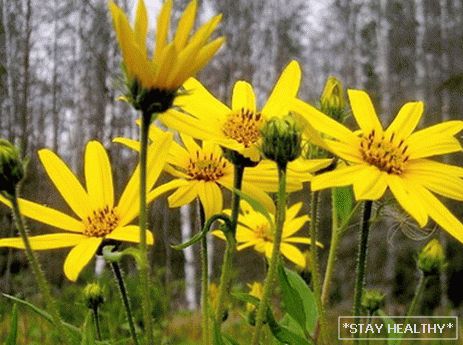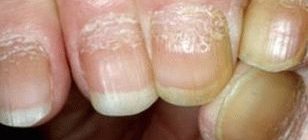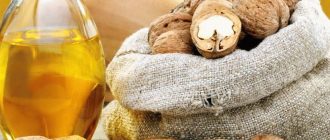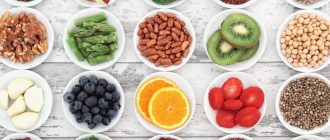 Mon, 18 Jul 2016
Mon, 18 Jul 2016
Contents
Jerusalem artichoke – a general description
Топинамбур (в народе — земляная груша) — вид
perennial tuberous plants of the Astrov family with high (up to
two or more meters) straight stem covered with short hairs,
and root shoots, on the endings of which edibles develop
tubers. The leaves of Jerusalem artichoke petiolate, serrate on the edges, have
heart-ovoid shape. Plant is considered the nearest
sunflower relative.
At the end of the stem in August, a yellow basket is formed,
very similar to a sunflower flower, but differing significantly
smaller size. The fruit in the form of small seeds ripens in September.
Topinambur cultivars are cultivated as a valuable fodder and
food product having good taste and nutritious
quality.
Jerusalem artichoke – types and places of growth
In nature, there are about 300 varieties of Jerusalem artichoke, and only
10 of them grow in natural conditions on the continent –
North America. In some species, the tubers are large and juicy, in others –
small and dry, and in the third – and completely absent, such species
usually used as ornamental plants.
In our country, the most common:
– White Jerusalem artichoke; – Red Jerusalem artichoke; – Jerusalem artichoke
Maikop; – Jerusalem artichoke “chambers”; – Jerusalem artichoke spindle-shaped; –
Jerusalem artichoke early maturing; – hybrid variety Jerusalem artichoke “interest”,
which is several times higher than the yield of other species.
The chemical composition of the plant tubers is very similar to the tubers
potato However, unlike him, Jerusalem artichoke is not stored for a long time,
It also contains more polysaccharides, vitamins and
mineral substances. Most varieties of earthen pear
undemanding to care, soil and habitat conditions, winter-hardy, but
may die in the harsh conditions of northern Russia.
Jerusalem artichoke – medicinal properties
The roots of Jerusalem artichoke are rich in inulin, which is why they have
specific sweetish taste. In addition, the tubers are
source of vitamin C, potassium, magnesium, iron and fiber. These
substances make Jerusalem artichoke not only a tasty product, but also
extraordinarily useful. Root juice reduces the acidity of the stomach,
eliminates constipation and abdominal pain, has anti-inflammatory
action, reduces cholesterol.
The decoction of the plant has sugar-lowering properties, improves
thereby the state of diabetics, increases hemoglobin, prevents
obesity and salt deposition, neutralizes the effects of toxins and
heavy metal compounds on the body, which is especially important for
residents of megacities. Topinambur found its application in
cosmetology, where it is used as a means of eliminating
wrinkles.
Jerusalem artichoke – dosage forms
Medicinal raw materials – the grass collected at the initial stage of flowering, and
girasol tubers that need to be dug out directly
before use. Storage is possible, but should not be done.
more than a week, in a plastic container and in cold conditions. Tubers
well preserved in the soil until the spring, but quickly deteriorate on
the air. Jerusalem artichoke grass is used in fresh or dry form for
making tea, salads, decoctions and infusions.
Jerusalem artichoke – recipes of traditional medicine
– The easiest way to recovery and prevention – there are fresh
Jerusalem artichoke tubers with a peel of 50 grams. one to three times a day.
– It is advisable to take squeezed juice daily for 1/2 cup
for 12-15 days with gastrointestinal diseases.
– Refreshing kvass from earthen pear: cut tubers, pour
cold water, add a little yeast, you can slice of rye
bread and leave in a warm place for three to four days. Drink this
kvass is recommended every day as an excellent preventive (from
diabetes mellitus) and a multivitamin remedy.
– A decoction that reduces pressure and blood sugar: three root vegetables
chop and throw in boiling water (1 liter), boil for 10-12 minutes,
then drain the liquid and consume 200-400 ml per day.
– Baths with the addition of decoctions of Jerusalem artichoke leaves are recommended
with the weakening of immunity, diseases of the joints, fatigue.
The required number of procedures – 8-12 baths.
– Mask from wrinkles: clean tubers, rub and apply to
face 2-3 p. in Week. This mask returns the skin primordial
elasticity and smoothness.
Jerusalem artichoke – contraindications
Contraindications not identified. However, it should be noted that
tubers and leaves consumed in excessively large quantities
able to cause flatulence.
Comments
Eva 05/07/2016 Well, that’s it! Only my Jerusalem artichoke will grow, and he
I have to grow up soon – I will start making masks! What is the woman
will pass by such a promise that her skin will become elastic and
to rejuvenate)) And I, always tear out the Jerusalem artichoke and just throw it away.
Lucy 05/07/2016 At the expense of eating Jerusalem artichoke tubers, I promise not to
I will … But I will take a bath with him. I mean then
when I feel tired. I hope all this is true, and
This plant fatigue, indeed, relieves. Well, it won’t be worse.
exactly)) Nastya 07/05/2016 My friend is using Jerusalem artichoke,
precisely for lowering blood sugar. Says he is spectacular to her
helps. I myself have not tried these tubers, but this year,
be sure to eat. After such a laudatory article, in favor of this
plants, it is a must. Valentina 07.05.2016 I know that
во время войны, Jerusalem artichoke, спасал людей от голодной смерти. I know
what it tastes like potatoes. But somehow its never
I tried, though, it grows with me too. Now having read it all
полезные свойства, обязательно попробую его tubers. Now
it’s my time to be shocked! У меня этот Jerusalem artichoke, растет везде.
Moreover, it is impossible to get rid of him! I tear it out and
digging up, and all the same next year, in some miraculous way
grows up!






